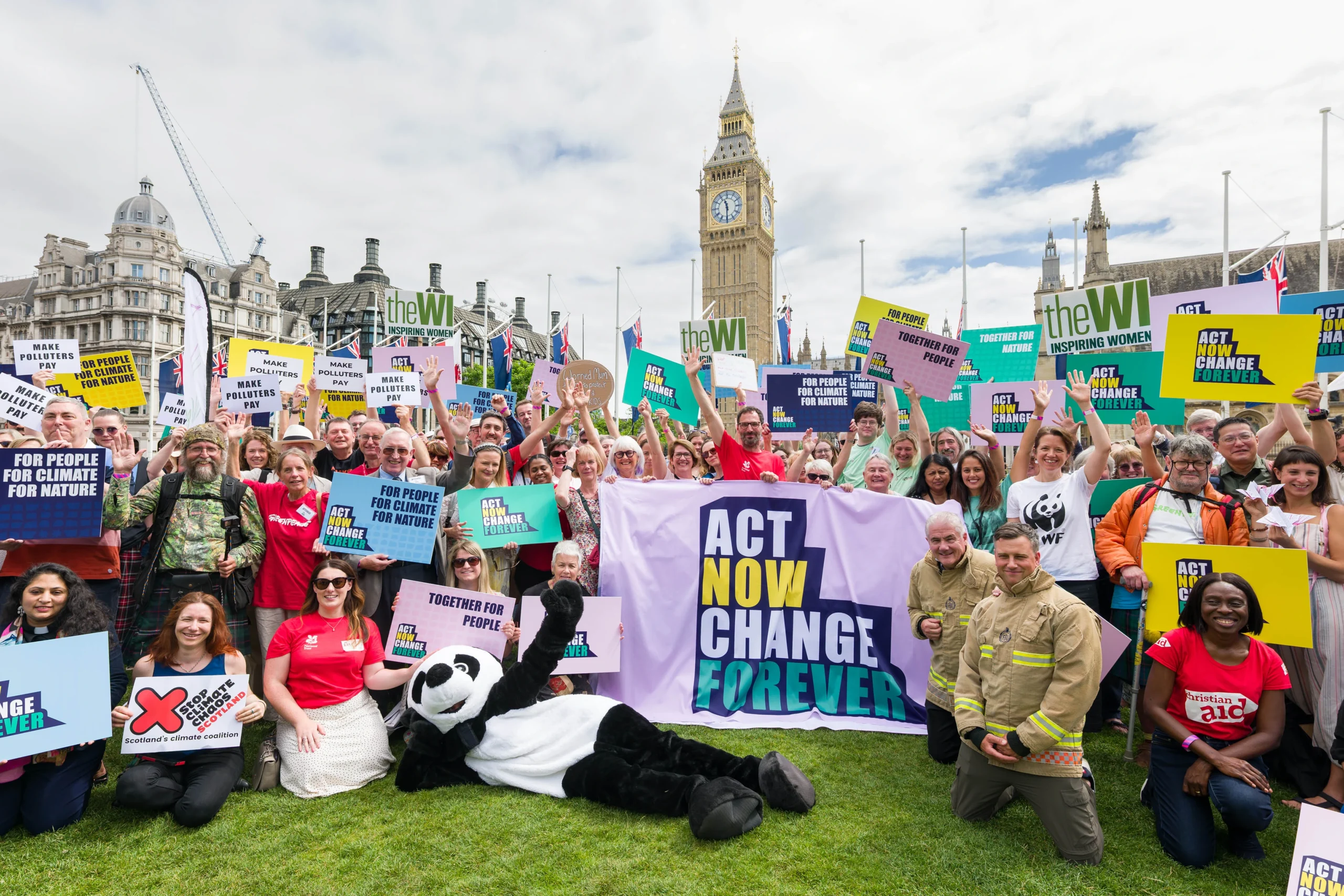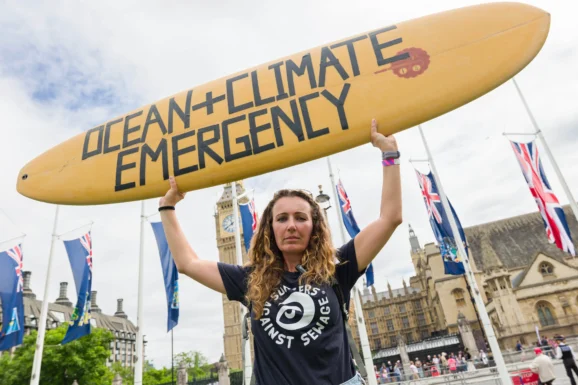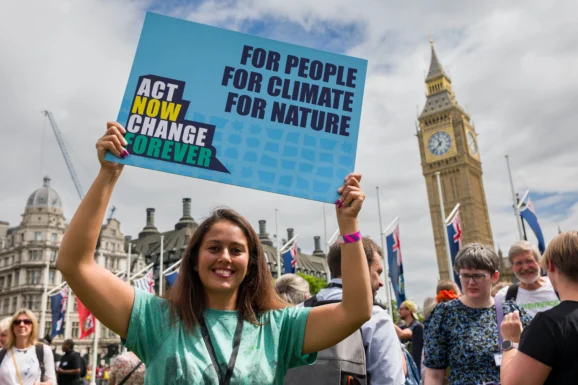Thousands descend on Westminster in UK’s largest climate lobby in a decade
- Published
- News

Thousands of people from across the UK gathered in Westminster yesterday afternoon for what organisers described as the largest mass climate lobby in over a decade, writes Sarah McArthur and Stanley Johnson
More than 5,000 campaigners from more than 80% of UK constituencies travelled to meet their MPs and demand urgent action on climate change and biodiversity loss.
The lobby, held just two days before the Climate and Nature Bill returns to Parliament on Friday, saw approximately 300 MPs take meetings throughout the day.
Banners reading “Make Polluters Pay” and “Act Now, Change Forever” were held high in Parliament Square, where the mood was said to be both determined and hopeful.
Activist groups also brought attention-grabbing props, from a giant melting planet-shaped ice cream to surfboards highlighting ocean pollution.
The lobby was organised by the Climate Coalition, a network of more than 120 NGOs including Greenpeace, Oxfam and the National Trust.
Other groups outside the Coalition, such as the Fire Brigades Union and the National Pensioners Convention, also attended.
The lobby was also supported by dozens of celebrities including the actor Brian Cox and broadcaster Stephen Fry and Konnie Huq.
Together, they pressed MPs to deliver funding for communities most affected by climate change, prioritise nature restoration, support UK jobs, and help secure a greener and more equitable future.
Among the campaigners were first-time visitors to Parliament as well as seasoned activists, many of whom spoke of a shared urgency and desire to be heard by those in power.
“This is the first time I’ve ever come to Westminster, so I’m a bit nervous about it,” one said. “But I just feel that we need to claim the narrative on this.”
Originally tabled by former Green Party leader Caroline Lucas in 2020, the Climate and Nature Bill seeks to embed the UK’s international climate and biodiversity commitments into domestic law. It also proposes the creation of a citizens’ assembly to guide long-term strategy.
Although the Bill had cross-party support when it last appeared in Parliament in January, the debate was pushed back to 11 July, a delay many saw as an attempt by the government to quietly shelve it.
Some organisations attending the lobby focused heavily on urging MPs to support the Bill, viewing its timing as a crucial opportunity. “The timing of this is perfect for influencing the CAN Bill,” a Greenpeace representative said at the event.
The Bill, now sponsored by Liberal Democrat MP Dr Roz Savage, would require the UK to account for all its carbon emissions, including those currently excluded, such as international shipping, aviation and outsourced manufacturing.
It also proposes an annual government strategy on climate and nature, and the creation of a citizens’ assembly to advise on policy.

Supporters argue the legislation would close loopholes and ensure the UK’s existing climate and biodiversity commitments are fully delivered. But campaigners say it faces significant political resistance.
Labour has said it backs the “spirit and substance” of the Bill. Following the January debate, Energy Secretary Ed Miliband promised a yearly update on the state of climate and nature, a stronger focus on biodiversity, and greater public involvement in decision-making.
But critics point to a broader pattern of climate policy retreat. Since taking office, the government has slashed funding for home insulation and energy efficiency, paused the Sustainable Farming Incentive, and reduced the UK’s international climate finance by cutting the aid budget.
Former Green Party leader Caroline Lucas said the government appeared to be backing away from climate ambition. “I think the government is spooked by Reform, by the kind of pushing back of climate policy and action that we’re seeing from people like Richard Tice and Nigel Farage,” she said. “They’re looking at the electoral maths and thinking that somehow they can’t afford to be more ambitious on climate change.”
Simon Oldridge, researcher at MP Watch and an advisor to the campaign for the Bill, said Labour’s approach reflects a reluctance to talk about climate head-on. “Instead of just taking the right on directly and going to the public and being really frank, Labour are doing exactly what the polluters want, which is just to be too timid to talk about it, because they think they’re going to lose electorally.”
He said the legislation would require emissions to be cut by 40% by 2030 compared to 2023 levels if it were brought in line with the Paris Agreement and covered all sectors. “That’s actually massive,” he added. “It might not be as much as some people want… but it might not be possible to go any faster than that.”

Oldridge acknowledged the level of public investment needed would be significant, but pointed to historic precedents. “We should be moving on to a wartime footing,” he said. “When I speak to a lot of scientists… the message I hear privately from scientists is that some of them are losing hope.”
Lucas added that the Bill had been shaped by leading scientists over many years. “That bill has been the work of so many experts… in terms of putting together what the kinds of targets are that we need and the strategies to get there,” she said.
Despite strong support from attendees, the Climate Coalition itself stopped short of explicitly backing the Bill in its official lobbying asks, instead grouping its goals under the broader themes of climate, nature and people. Many individual campaigners nonetheless raised the legislation with their MPs.
“There’s universal support for the intent of the Bill,” Helen Meech, Executive Director of the Climate Coalition, said. “We’ve got these international targets and we need the legislative framework to deliver them—whether that’s through the CAN Bill or another Bill.”
Others focused on different priorities, from fuel bills and green jobs to localised concerns such as river pollution or planning reform. Groups like Greenpeace called for a halt to new oil and gas projects, while the National Trust prioritised enforcement of existing legislation and support for farmers.
Mark Funnell from the National Trust, said: “Different environmental charities have slightly different perspectives on the Bill.
“We support its intent completely… but we think that our main priority now needs to be the [Environmental Improvement Plan]… we’ve got a lot of what we need—we just need to get that momentum going.”

There is also widespread scepticism that the Bill will progress on Friday. Labour MP Richard Burgon said he expects the debate to be blocked again, likely overtaken by other parliamentary business.
In a video message to campaigners, Miliband emphasised the steps the government is already taking and stuck carefully to the language of addressing the “climate and nature crises.” He said: “We’re hearing you loud and clear… we know we face huge urgency on the climate and nature crisis… but while we should be alarmed, we have agency to do something about it.”
Despite doubts about the Bill’s future, campaigners remain determined to keep it on the agenda. More than 90 MPs have signed a motion calling for dedicated debate time. Some suggested the Bill will keep returning to Parliament in various forms until it eventually passes.
“These sorts of events do not very often have specific results,” one campaigner said. “But they build the climate, if I may use that word, of support and reminding that you can do politics with integrity.”
All images: The Climate Coalition/ PA
RECENT ARTICLES
-
 Lasers finally unlock mystery of Charles Darwin’s specimen jars
Lasers finally unlock mystery of Charles Darwin’s specimen jars -
 Strong ESG records help firms take R&D global, study finds
Strong ESG records help firms take R&D global, study finds -
 European Commission issues new cancer prevention guidance as EU records 2.7m cases in a year
European Commission issues new cancer prevention guidance as EU records 2.7m cases in a year -
 Artemis II set to carry astronauts around the Moon for first time in 50 years
Artemis II set to carry astronauts around the Moon for first time in 50 years -
 Meet the AI-powered robot that can sort, load and run your laundry on its own
Meet the AI-powered robot that can sort, load and run your laundry on its own -
 Wingsuit skydivers blast through world’s tallest hotel at 124mph in Dubai stunt
Wingsuit skydivers blast through world’s tallest hotel at 124mph in Dubai stunt -
 Centrum Air to launch first European route with Tashkent–Frankfurt flights
Centrum Air to launch first European route with Tashkent–Frankfurt flights -
 UK organisations still falling short on GDPR compliance, benchmark report finds
UK organisations still falling short on GDPR compliance, benchmark report finds -
 Stanley Johnson appears on Ugandan national television during visit highlighting wildlife and conservation ties
Stanley Johnson appears on Ugandan national television during visit highlighting wildlife and conservation ties -
 Anniversary marks first civilian voyage to Antarctica 60 years ago
Anniversary marks first civilian voyage to Antarctica 60 years ago -
 Etihad ranked world’s safest airline for 2026
Etihad ranked world’s safest airline for 2026 -
 Read it here: Asset Management Matters — new supplement out now
Read it here: Asset Management Matters — new supplement out now -
 Breakthroughs that change how we understand health, biology and risk: the new Science Matters supplement is out now
Breakthroughs that change how we understand health, biology and risk: the new Science Matters supplement is out now -
 The new Residence & Citizenship Planning supplement: out now
The new Residence & Citizenship Planning supplement: out now -
 Prague named Europe’s top student city in new comparative study
Prague named Europe’s top student city in new comparative study -
 BGG expands production footprint and backs microalgae as social media drives unprecedented boom in natural wellness
BGG expands production footprint and backs microalgae as social media drives unprecedented boom in natural wellness -
 The European Winter 2026 edition - out now
The European Winter 2026 edition - out now -
 Parliament invites cyber experts to give evidence on new UK cyber security bill
Parliament invites cyber experts to give evidence on new UK cyber security bill -
 EU sustainability rules drive digital compliance push in Uzbekistan ahead of export change
EU sustainability rules drive digital compliance push in Uzbekistan ahead of export change -
 AI boom triggers new wave of data-centre investment across Europe
AI boom triggers new wave of data-centre investment across Europe -
 Lammy travels to Washington as UK joins America’s 250th anniversary programme
Lammy travels to Washington as UK joins America’s 250th anniversary programme -
 China’s BYD overtakes Tesla as world’s largest electric car seller
China’s BYD overtakes Tesla as world’s largest electric car seller -
 FTSE 100 posts strongest annual gain since 2009 as London market faces IPO test
FTSE 100 posts strongest annual gain since 2009 as London market faces IPO test -
 Five of the biggest New Year’s Eve fireworks happening tonight — and where to watch them
Five of the biggest New Year’s Eve fireworks happening tonight — and where to watch them -
 UK education group signs agreement to operate UN training centre network hub
UK education group signs agreement to operate UN training centre network hub



























